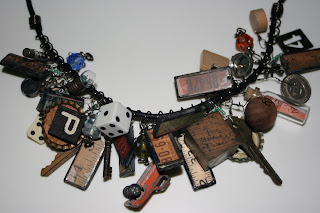 I'm starting to get a little more adventurous. I decided to paint the lampshades on my kitchen chandelier. Then I added baubles. It still needed something so I cut up a Spanish dictionary and pasted it onto the paint and covered the whole shade with a gel medium. I like how it looks and it was loads of fun to do. Let's hope I didn't add anything flammable. Now, what else can I attack with a paintbrush?
I'm starting to get a little more adventurous. I decided to paint the lampshades on my kitchen chandelier. Then I added baubles. It still needed something so I cut up a Spanish dictionary and pasted it onto the paint and covered the whole shade with a gel medium. I like how it looks and it was loads of fun to do. Let's hope I didn't add anything flammable. Now, what else can I attack with a paintbrush?
Tuesday, July 31, 2007
a little time can be dangerous
 I'm starting to get a little more adventurous. I decided to paint the lampshades on my kitchen chandelier. Then I added baubles. It still needed something so I cut up a Spanish dictionary and pasted it onto the paint and covered the whole shade with a gel medium. I like how it looks and it was loads of fun to do. Let's hope I didn't add anything flammable. Now, what else can I attack with a paintbrush?
I'm starting to get a little more adventurous. I decided to paint the lampshades on my kitchen chandelier. Then I added baubles. It still needed something so I cut up a Spanish dictionary and pasted it onto the paint and covered the whole shade with a gel medium. I like how it looks and it was loads of fun to do. Let's hope I didn't add anything flammable. Now, what else can I attack with a paintbrush?
Sunday, July 29, 2007
Saturday in Gathersburg, MD
We've read his books, watched his video's, bought his papers but never attempted to reproduce any of his artwork. The first class was Charmed Possessions.
 It was a mixture of domino's, mica, stamps , jewelry and lots of other fun stuff. Wow it was fun and easy. After the class, the lack of sleep was catching up with us. We headed to Boston Market and for some protein.
It was a mixture of domino's, mica, stamps , jewelry and lots of other fun stuff. Wow it was fun and easy. After the class, the lack of sleep was catching up with us. We headed to Boston Market and for some protein.  The lunch got our juices going and we began the next class, Industrial, with gusto. This one challenged our creativity. We turned chipboard into metal art. It has so much potential, I can't wait to try it out at home. Here is what I managed to produce. Doesn't it look like metal?
The lunch got our juices going and we began the next class, Industrial, with gusto. This one challenged our creativity. We turned chipboard into metal art. It has so much potential, I can't wait to try it out at home. Here is what I managed to produce. Doesn't it look like metal? The classes we signed up for were now complete. But Tim had one more class that day. Do you think there might be openings? Never hurts to ask, right? Fantastic, they found three spots for us. We had to sit at the instructors table. Almost like we were being punished, had I mentioned that Monica was with us? She brings the life to the party and our group was noticed. So sitting at the "bad girls" table was not unexpected. The third class was "Road Trip." How appropriate. This was also a blast. We took found objects and with the help of predrilled holes we were able to attach them to a necklace:
The classes we signed up for were now complete. But Tim had one more class that day. Do you think there might be openings? Never hurts to ask, right? Fantastic, they found three spots for us. We had to sit at the instructors table. Almost like we were being punished, had I mentioned that Monica was with us? She brings the life to the party and our group was noticed. So sitting at the "bad girls" table was not unexpected. The third class was "Road Trip." How appropriate. This was also a blast. We took found objects and with the help of predrilled holes we were able to attach them to a necklace: This has wonderful potential when we have "found" objects from our own trips.
This has wonderful potential when we have "found" objects from our own trips.
What a wonderful day. Thank you Tim and the Rubber Chicken. We will be back. You throw a great party!
Wednesday, July 25, 2007
Musings from China Part II
Spitting
Spitting in public is relatively common among men as is hacking up phlegm. Some aim for drains and sewer inlets while others simply hurl onto the sidewalk. I am reminded that Nanny’s original suitor died of the Spanish influenza pandemic of 1918-1919. Old pictures from those years show posted signs on city sidewalks urging the public not to spit. I assume spitting in public was rather common practice in those days. Maybe the Spanish flu broke American men of this habit. The spitting in
Umbrellas
Many, many women use umbrellas for shade. One friendly young lady greeted me on one of my walks (see “Friendly” below) and we struck up a conversation. I asked her about her umbrella. She told me she was aware those American women prefer to be bronzed by the sun but Chinese women, especially young women, avoiding the sun to prevent freckles. For them, I guess, a clean and alabaster complexion is deemed more beautiful than shaded skin tones.
Friendly or Stalking
In
Traffic and Driving
Dirt and Pollution
The air is thick with particles of indeterminate origins. Unwashed cars accumulate a thick coating of powder and grit. New buildings of glass and chrome are dimmed by the ever encroaching sheets of grime. I’ve heard that periodic sand storms sweep through the city. In the winter, I am told, coal is the chief source of heat and homes in the Hutongs (old residential areas) buy coal from vendors wheeling small carts through the neighborhood. Thousands of small stoves burning raw coal for heat – the soot must be dense.
Speaking of Dirty Cars
On one back street I noticed a line of cars along the curb each being wash by a brigade of bucketeers with sponges and towels. This is
Labor and Machinery
The balance is skewed heavily in favor of labor; even when constructing modern office towers. Cranes and heavy equipment are on site but much of the work relies on sweet and brawn. Earth is often moved by handcarts and the continuous comings and goings are reminiscent of a bucket brigade dousing flames over 100 years ago. I witnessed new sewer pipe being laid and there was no backhoe in site. Shovels and carts made trenches and displaced earth. The most advanced piece of technology on the site was a lever. But don’t be fooled, these are industrious and inspired people. Westerns might scoff at the process, but the results are changing the face of
Service with a Smile
There is no tipping in
Numbers and SIM cards
Numbers hold special significance in
Safety
I not yet felt unsafe in my wanderings through
Volatility
The people are generally placid and quiet. Moving about life they appear hard to rile and upset. But, seemingly innocuous events and exchanges can suddenly set tempers afire. Loud arguments erupt. Shouting in Chinese has a decidedly ugly and acidic tone. These bouts might involve two passersby on the street and two coworkers. In a retail store, a coworker encroaching on another’s transaction will likely receive a quick and loud rebuke even when the interloper appears to be attempting to help. The Chinese all seem to share a deeply-seated strong stubborn and independent streak. When presented with a problem or unexpected turn they will shun assistance as they try to resolve the issue unaided.
Musings from China Part I
1,000’s of shops gone, 1,000’s of shops remain
According to news articles, thousands of small, local shops have been raised in preparation for the Olympic Games in 2008. Still, thousands of shops remain. Block upon block, main street, side street or Hutong alley, the shops are sprinkled throughout Beijing like poppy seeds on a bun. The shops vend tobacco products, fresh fruits and bottled drinks to passers by. Some offer phone service to the outside world; ironic in a city where nearly everyone in the business centers is chatting away on cell phones as they ramble about. Often, the proprietor, if male, is asleep in a chair in front of the store (funny, I never see women sleeping in the front of the shop, sipping a cup of tea, yes; sleeping, no – being male, I chose not to dwell on this disparity).. The store usually measures about six-feet by six-feet and some are smaller yet. The profits must be minuscule and these outlets appear to family enterprises. My parents grew up in the era of candy shops and tap rooms. During the 1930’s, American families in row homes in small towns and big cities would covert their front room to a small shop or into a bar and eke out small profits to contribute to the family prosperity. So much of today’s China reminds me of yesterday’s America.
Underground economy
The Silk Market (or Silk Street) is a notorious tourist shopping destination in Beijing. The large market is 5 or 6 stories tall and covers more than one-half of a city block. Inside, hundreds (thousands) of vendors have woven a tight web to ensnare visitors that have come, one must believe, to part with their Yuan. Merchants step out into the narrow aisle ways to steer targets into their shops. They beckon and call to those that chose to keep strolling by. Some reach out and tug at those who have ignored their call. The patter is rapid and insistent. Browsing is tedious and wearing. But browsing is only the tip of the ice berg. If you do find something you like, get ready to negotiate. The first price is “for you only.” You must respond with a lower amount; rule of thumb, one-half of the merchants first offer. Dickering will continue until a price in the middle is seemingly agreed. If you purchase now, the merchant has won. Instead, you must now walk out of the shop in search of the next vendor; you will be summoned back before you take two steps down the aisle. The price that was “for you only” and practically a gift will be reduced another ten to twenty percent. With a little more effort, you will eke out ten to twenty percent more before the deal is closed. Walking away with your purchase imparts little satisfaction. You are left to contemplate how much lower the merchant was prepared to go. Maybe, after a thousand such negotiations, you will be able to begin to understand the merchant’s bargaining position.
The Silk Market is served by a subway stop with a staircase and escalator that lead directly into the ground floor. The subway stop is a sprawling underground complex that includes a market of shops sitting between the street above and the station below. If you dawdle long enough you will eventually learn the true catacomb-like nature of this underground mall. I found the selection in a CD/DVD shop to be uninspiring and was preparing to leave. The shopkeeper, a young woman, stopped me and announced that there were more DVD’s behind the shelves. As I cocked my head from side to side in search of the remaining inventory, a small bookshelf behind the cash register was rotated forward and out. Behind the bookcase was a hidden door – a HIDDEN DOOR! The room behind the door more than doubled the size of the shop. It was crammed full of DVDs in packaging that appear legitimate in every way. Regardless, it seemed unlikely that someone would go through all this trouble to sell legitimate merchandise and I elected to leave without making a purchase. To exit, the shopkeeper had to rap on the door and wait for it to be opened from the outside.
Progress on Steroids
The frantic pace of construction throughout Beijing is rousing. Steel-beam skeletons stretch for sky all over the city. One is destined to be the tallest building in all of Asia. Today this future colossus is two sprouting towers that are leaning towards each other as they gain distance from earth. It appears the inclined structures will meet at a contorted angle about fifty stories into the air. I can’t help but wonder over the myriad of measurements being taken daily to assure that the complex geometries of these individual elements will mesh as planned. By edict, all exterior construction in the city must be completed by December 31, 2007. During the Olympic Games in 2008, the city will appear modern, thriving and complete. I say ‘will’ because I have no doubt the Chinese will finish the work in time. The buzz of activity and underlying organization has no human comparison; it is most like a colony of army ants. Individuals scurry about completing task upon task. In aggregate, these task amount to rapid progress. Proud citizens brag that six stories may be added to a building in one day – I do not doubt the claim. Meanwhile, infrastructure projects are connecting new to old and reconnecting the old that is to remain. It is a symphony of progress and all parts remain in perfect harmony. Again I am reminded of past generations in America. For its time, daily progress in construction of the Empire State Building was without peer. At first, New Yorkers marveled at the rapid evolution. Eventually, they came to accept such progress as routine but even the most jaded New Yorker is bound to find something worthy of amazement in today’s Beijing. Westward rail development represents another crowning achievement of American industry. Rail lines spread west from the Mississippi at an astounding rate and traversed monstrous obstacles. Rail lines companies competed to lay track faster than the others. It wasn’t just economics that spurred the pace of development, egos became part of the mix as industrialist such as Clement and Durant dueled for acknowledged supremacy among peers. Ironically, the westward-ho railroad rush was build on the backs of immigrants – Chinese immigrants.
Dormitory Life
I don’t know how I missed them at first. Moreover, I studied buildings under construction in Beijing for three weeks before I noticed to first of the thinly-sheathed structures. But, once I noticed the first, the sight become ubiquitous. Each building site had one; most had several. Usually three stories tall and a little wider than a single-wide mobile home, these austere structures are dormitories for workers. A dormitory is defined as, “A building providing sleeping quarters for a number of persons.” Sleeping quarters describes these structures precisely. Plumbing is not evident; I am less certain about electricity but suspect it is absent as well. The thin cladding likely amplifies the summer heat and I suspect day time temperatures inside are 20 – 30 degrees warmer that the 90+ midday highs during summer.
Minimalist Marketing
As the “bicycle kingdom” moniker wanes, a new face of Beijing emerges that is best expressed as “kingdom of aggressive merchants.” Yet, in this land of in-your-face salesmanship, extremes at the other end of the scale are also evident. I reckon the Chinese would somehow tie such coexistence of extremes to natural balance (the yin and yang). The other end of the scale is represented by restaurants that attempt to disappear into the backdrop of the city. Entrances are disguised or hidden. Exterior signs are obscure or entirely absent. On entering the establishment you must navigate a vague and indistinct path to the main room. The eating are is kept very dark (I understand some are entirely lightless) and you are provided with a flashlight to find the restrooms. The flashlight is of marginal assistance as the restrooms are as hidden and unmarked as the front door. This atmosphere is intended to heighten the culinary experience. I assume the some believe that disorienting the sense of sight may accentuate the other senses included taste and smell. The restaurant I experienced had a lighted exterior door that wasn’t a door. The real door was ten yards to the left hidden behind a few trees. A few stepping stones were the only indication that there might be a purpose within or beyond the stand of trees. As you approach the last stepping stone, a large plate of black glass magical slides to the side to reveal a darken passage way. The glass seals you in after you cross the threshold and you are left to navigate your way to the main floor via a dark and convoluted passage. Mirrored walls along the way continually tease your awareness and orientation. Only when you reach a bar lighted solely by the bottles on the back shelve (lights under the bottles emit a diffused glow about the bar) can you be sure that your appetite is to be sated this evening.
Naming Nissans
Many cars in China are the same as we have in the USA. About half of these have been renamed including all of the Nissans. On a divergent note, I am told that the Chinese still hold a great deal of resentment towards the Japanese stemming from war atrocities and many Chinese are reluctant to buy Japanese cars. Still, a number of Nissans get through this resistance branded unlike those we see in the USA. Of special interest to me is the erstwhile Nissan Xterra. In China the name translates as “have SUV will travel” – the name is Paladin.
Arm-in-Arm
Many young woman stroll through the city in pairs; often they are either holding hands or have their arms locked at the elbows. The streets of Beijing are very safe and I don’t believe the pairing is for security. Likewise, I am certain the custom is unrelated to same-sex romantic leanings. The practice seems to be mere custom.
Thursday, July 12, 2007
Missing My Husband
Am I ready to Begin Blogging?
Reasons for starting a blog. First is "blog" capitalized? For now it is not. First reason- My husband is in China and I want a place to remind him of home. Second reason-my oldest is leaving for Australia, I want to remind her of home. Third reason-my youngest will be going back to school, I want to remind her of home. Forth reason-I have two make that three dogs, I need a place to share their antics Fifth reason-I want to share my crafts and finds.




